When you're on the hunt for the best coffees to use with your French press, you'll want options that are rich, bold, and bursting with flavor. Consider the Allegro Coffee Vienna Roast Ground Coffee, which offers a smooth and subtly sweet experience. Or perhaps the Coffee Fools Organic Fair Trade House American, a light roast that brings out natural flavors without additives, might pique your interest. But there's more to explore, including some highly recommended French press makers and other delightful coffee selections. Interested in exploring what makes these picks stand out? Let's delve into it.
Main Points
- Allegro Coffee Vienna Roast offers a smooth, medium-bodied flavor, ideal for French press brewing.
- Coffee Fools Organic Fair Trade House American provides natural flavors and is made from 100% high-grade Arabica beans.
- African beans deliver fruity, floral notes for a bright, flavorful French press coffee.
- South American beans offer rich, chocolatey, and nutty undertones, perfect for a bold French press brew.
- Opt for freshly roasted whole beans and grind just before brewing for maximum flavor intensity.
Allegro Coffee Vienna Roast Ground Coffee, 12 oz
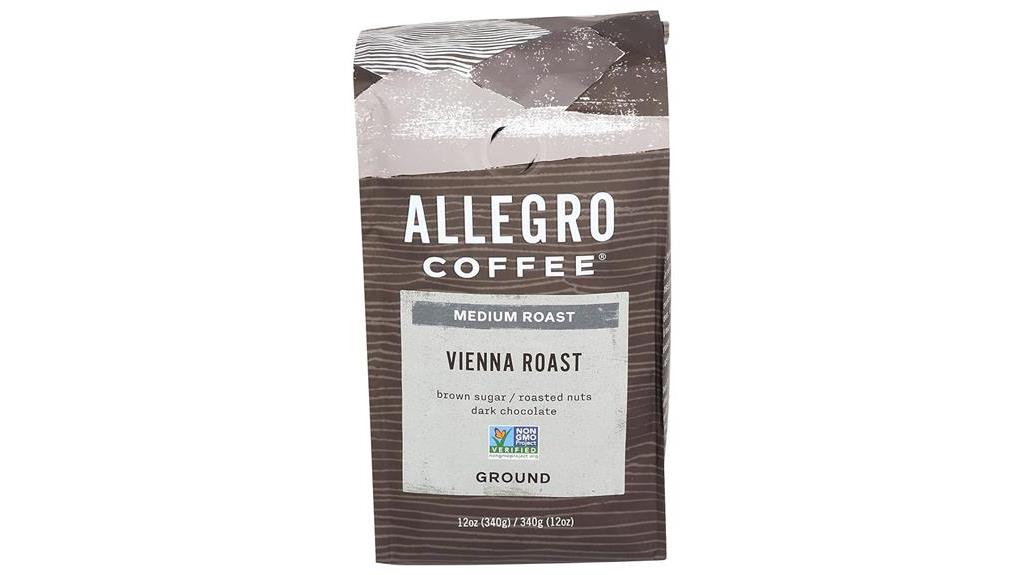
For coffee enthusiasts seeking a smooth and medium-bodied brew, Allegro Coffee Vienna Roast Ground Coffee, 12 oz, offers a delightful option for French press. This specialty ground coffee, sourced from the Americas, highlights an inherent sweetness that pairs well with its medium roast profile. You'll enjoy subtle notes of chocolate and toffee, creating a balanced and satisfying cup.
To make the most of this coffee in a French press, use coarse grounds and follow the standard brewing method. Add hot water, let it steep for about four minutes, and then press the plunger down slowly.
While some users find the flavor lacks distinct mocha notes, many appreciate its smooth and delicious taste, especially when considering its price point.
Best For: Coffee enthusiasts looking for a smooth and medium-bodied brew with subtle notes of chocolate and toffee, especially suitable for French press preparation.
Pros:
- Smooth and subtle flavor
- Medium-bodied with inherent sweetness
- Good price point
Cons:
- Lack of distinct mocha and other strong flavors
- Some users find the taste underwhelming
- Limited purchasing options (only available on Amazon)
Stainless Steel French Press Coffee Maker (21 ounce)
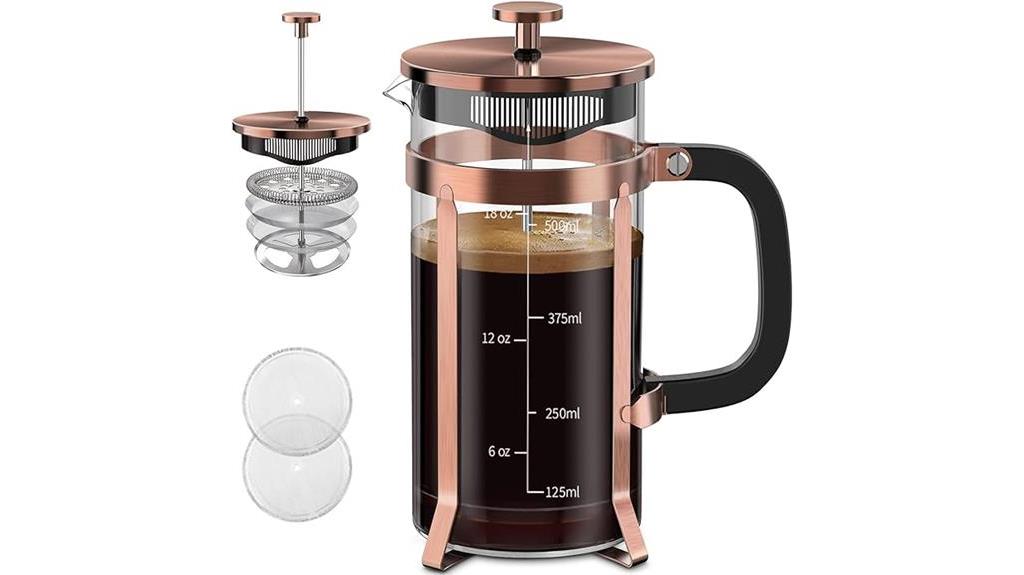
Ideal for both professional baristas and novice coffee lovers, the Stainless Steel French Press Coffee Maker (21 ounce) offers a durable and user-friendly way to brew smooth, flavorful coffee. Made of 304 stainless steel and borosilicate glass, it's built to last and is 100% BPA-free.
The 4-filter system guarantees effective coffee filtering, resulting in a clean and rich cup every time. With a 21-ounce capacity, this French press is also versatile—it's perfect for making tea, hot chocolate, or cold brew. Cleaning is a breeze since the glass beaker, filter, and plunger are all dishwasher safe.
Plus, it comes with a 2-year replacement policy for quality-related issues, giving you peace of mind. Available in a stylish copper color, it's a great addition to any kitchen.
Best For: Professional baristas and novice coffee lovers looking for a durable and user-friendly method to brew smooth, flavorful coffee.
Pros:
- Made of 304 stainless steel and borosilicate glass, ensuring durability and heat resistance.
- 4-filter system provides effective coffee filtering for a clean and rich cup.
- Dishwasher safe components make it easy to clean.
Cons:
- Some customers suggest potential improvements in metal quality.
- Concerns about the long-term durability of the screen.
- Manual operation might be less convenient for those preferring automated coffee makers.
BAYKA French Press Coffee Maker (34 Ounce)
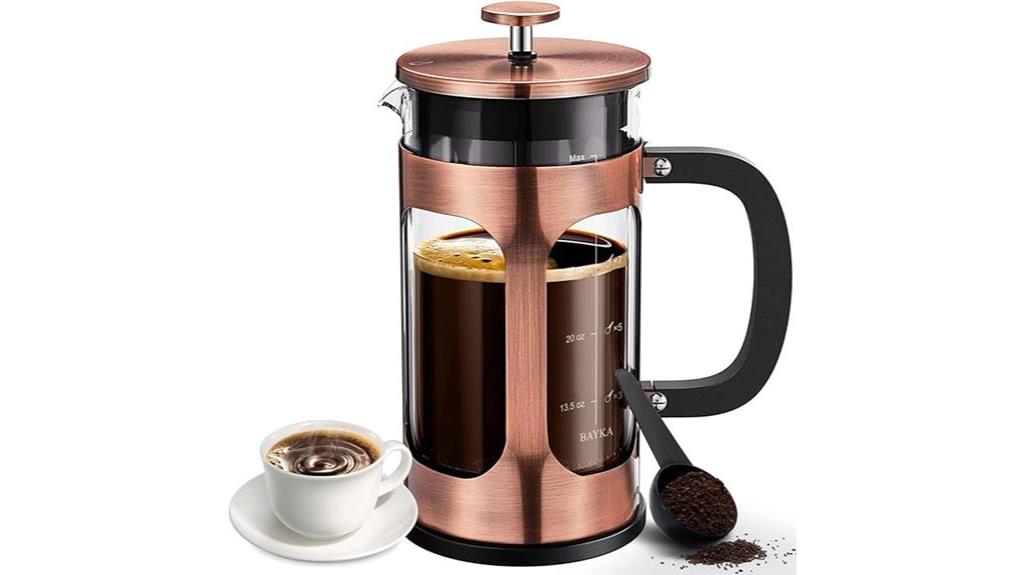
Anyone looking for a stylish and durable French press will love the BAYKA French Press Coffee Maker with its sleek copper finish and high-quality borosilicate glass. This 34-ounce coffee maker combines elegance with practicality, making it a standout in any kitchen.
The transparent design allows you to monitor the brewing process, ensuring your coffee is just right every time. Its 4-level filtration system guarantees a sediment-free cup, preserving the natural oils and flavors of your coffee.
Easy to clean, the BAYKA French Press is dishwasher safe and features a removable tank. Customers rave about its authentic coffee taste, durability, and ease of use. At an affordable price point, it's a great investment for coffee enthusiasts seeking rich, bold flavors.
Best For: Coffee enthusiasts who appreciate a stylish design and rich, bold flavors will find the BAYKA French Press Coffee Maker ideal.
Pros:
- Sleek copper finish and high-quality borosilicate glass.
- 4-level filtration system for sediment-free coffee.
- Dishwasher safe for easy cleaning.
Cons:
- Some users suggest improvements like stainless steel construction.
- Requires manual operation which might not be ideal for everyone.
- Glass can be more fragile compared to stainless steel options.
Coffee Fools Organic Fair Trade House American (French Press)
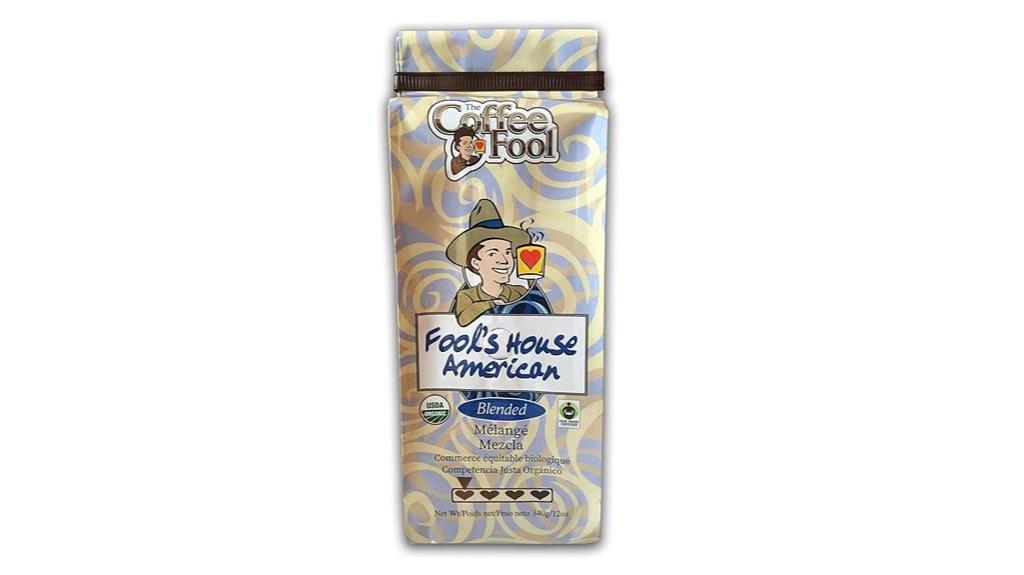
Coffee Fools Organic Fair Trade House American is perfect for those who appreciate a lighter roast that amplifies natural flavors without any additives. These beans are 100% pure high-grade Arabica, roasted and packaged in the USA.
You won't find any preservatives, sugar, dairy, gluten, or fat in this coffee, making it a healthier choice for your French press. The light roast brings out the beans' natural flavors, offering a bright and exciting taste that's a step above your average campfire coffee.
To brew, simply grind the beans to a coarse consistency, add them to your French press, and pour hot water over them. Let it steep for 4 minutes before pressing down the plunger. Enjoy your naturally flavorful cup!
Best For: Those who appreciate a light roast coffee that enhances natural flavors without any additives, ideal for French press brewing.
Pros:
- Light roast that brings out natural flavors
- 100% pure high-grade Arabica beans
- No preservatives, sugar, dairy, gluten, or fat
Cons:
- Light roast may not be suitable for those who prefer a stronger coffee flavor
- Requires a French press for optimal brewing
- May not be readily available in local stores
Bodum Chambord French Press Coffee Maker (34oz)
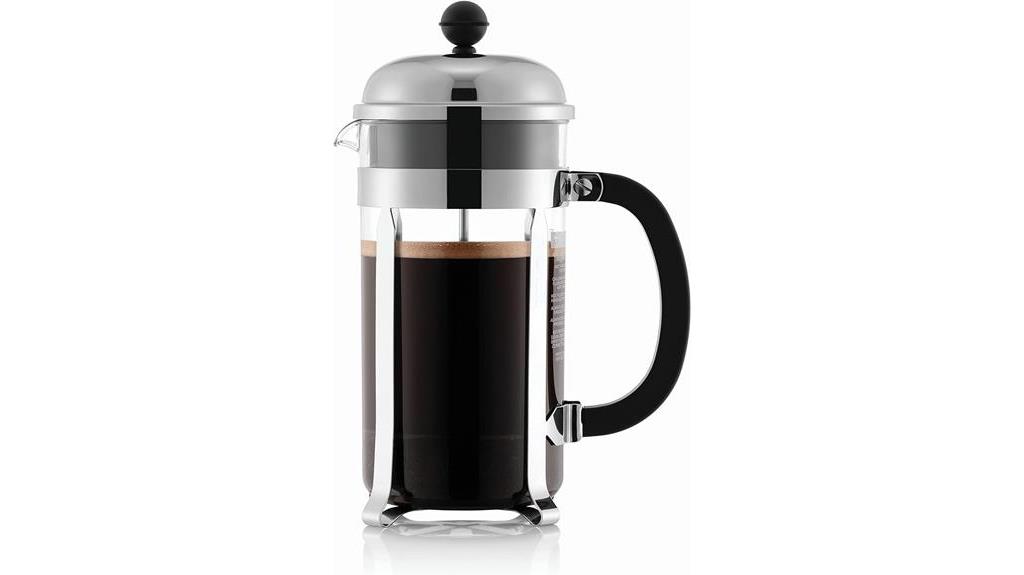
For those seeking a blend of classic design and high functionality, the Bodum Chambord French Press Coffee Maker (34oz) offers an exceptional choice. This French press boasts a timeless chrome exterior and sturdy construction using high-quality materials like steel and polypropylene. It's designed for both hot and iced coffee, making it versatile for any coffee lover.
The manual operation mode allows you to control every aspect of the brewing process, ensuring a rich and flavorful cup every time.
Cleaning is straightforward; just wash it in warm, soapy water before your first use. The reusable filter helps reduce waste, and the carafe is easy to disassemble for thorough cleaning.
With a stellar 4.6-star rating from over 18,000 reviews, it's clear that users appreciate its durability and design.
Best For: Coffee enthusiasts who appreciate a blend of classic design and high functionality in a manual brewing system.
Pros:
- Timeless chrome exterior and sturdy construction.
- Reusable filter reduces waste.
- Easy to disassemble and clean.
Cons:
- Manual operation requires more effort compared to automatic coffee makers.
- Requires precise control over grind size and water temperature.
- Chrome exterior may show fingerprints and smudges easily.
Factors to Consider When Choosing Coffee for French Press
When selecting coffee for your French press, consider the grind size, as a coarse grind works best to prevent over-extraction.
Pay attention to the roast level and freshness of the beans to guarantee a rich and flavorful cup.
Additionally, think about the flavor profile and origin of the coffee to match your personal preferences.
Grind Size Matters
Selecting the appropriate grind size is crucial to achieving a flavorful and balanced brew with your French press. For this brewing method, you'll want to use a coarse grind size to prevent over-extraction and bitterness. Coarse grounds allow the water to extract flavors and oils properly, resulting in a rich and full-bodied coffee that French press enthusiasts love.
When you grind your coffee too finely, it can clog the French press filter, disrupting the brewing process and negatively affecting the final taste. Think of the ideal grind size as being similar to breadcrumbs. This texture ensures that the grounds are large enough to avoid clogging but small enough to allow effective extraction of flavors.
Adjusting the grind size can greatly impact the taste and quality of your coffee. If your brew tastes too bitter or too weak, experimenting with slightly different grind sizes can help you find that perfect balance.
Always start with a coarse grind and adjust based on your preferences and the specific coffee beans you're using. This approach will help you consistently achieve a delicious and well-balanced cup of coffee with your French press.
Roast Level Preferences
How do you determine the best roast level for your French press coffee? Start by considering which flavors you enjoy most in your cup. Medium to dark roasts are usually preferred for French press brewing because they highlight bolder flavors and oils in the beans.
If you're looking for a balanced flavor profile with moderate acidity and a fuller body, medium roasts are a great choice. They offer a harmonious blend of flavors and tend to be very approachable.
For those who crave strong, rich, and smoky notes, dark roasts are the way to go. These beans can withstand the longer steeping time of the French press, resulting in a robust and intense cup. The extended roasting process brings out deeper flavors that many find satisfying and comforting.
Although less common, light roasts can still be used if you prefer a more detailed and brighter taste. Keep in mind that these beans have delicate flavors, which might be overshadowed by the French press method's bold extraction.
Ultimately, the choice of roast level significantly impacts the final taste of your coffee. Experiment with different roasts to find what suits your palate best.
Freshness of Beans
After determining your preferred roast level, it's time to focus on the freshness of the beans to guarantee a vibrant and flavorful French press coffee. Freshly roasted coffee beans are vital because they retain more of their natural oils and flavors, which directly impact the taste and aroma of your brew. Stale beans, conversely, can result in a flat and dull taste, leaving you disappointed with your French press experience.
To guarantee maximum freshness, opt for whole beans and grind them just before brewing. This practice helps preserve the important oils and flavors that are lost when beans are pre-ground. Always check the packaging for a roast date. Coffee beans are at their peak flavor within a few weeks of roasting, so aim to use them within this timeframe.
When selecting beans, keep in mind that the freshness greatly impacts the overall taste and aroma of your coffee. By prioritizing recently roasted beans and grinding them just before use, you'll enrich your French press coffee, making it richer and more robust. This simple step ensures each cup is as delightful and aromatic as possible.
Flavor Profile Choice
When selecting coffee for your French press, take into account the roast level and flavor profile to align with your taste preferences and enhance your brewing experience. Light roasts typically offer brighter, more acidic flavors. If you enjoy a lively cup with fruity or floral notes, a light roast might be your best bet.
Conversely, if you prefer a deep, rich taste, dark roasts are the way to go, delivering bolder flavors with hints of chocolate or spice.
Pay attention to the tasting notes on coffee bean packages. These descriptions can guide you to a coffee that complements the French press method, which tends to highlight the full-bodied and aromatic qualities of the beans. For a well-rounded experience, look for beans with balanced acidity and a medium to heavy body.
Experimenting with different beans is essential for finding your perfect cup. Try various blends or single-origin beans to explore a range of flavor profiles. Also, consider the coffee's aroma as it greatly impacts your overall enjoyment.
Origin of Coffee
To enhance your French press coffee experience, consider the origin of the coffee beans, as different regions impart unique flavor profiles. African beans often showcase fruity and floral notes, perfect if you enjoy a vibrant, aromatic cup.
Conversely, South American beans tend to offer chocolatey and nutty undertones, ideal for those who prefer a richer, more robust flavor.
Single-origin coffee beans are a great choice, providing a unique and consistent taste experience in each cup. By selecting beans from a specific region, you can better predict and enjoy the distinct flavors they bring to your French press.
The processing method of the beans also plays an essential role in flavor intensity. Washed beans usually produce a cleaner taste, while natural or honey-processed beans can offer more complex, intense flavors.
Understanding these methods helps you choose beans that suit your taste preferences.
Organic Vs. Conventional
Selecting the best beans for your French press also involves considering whether to choose organic or conventional coffee, each with distinct benefits and drawbacks. Organic coffee is grown without synthetic pesticides, herbicides, or fertilizers, which means it's better for the environment. These farming practices promote biodiversity and soil health, often resulting in higher quality beans with unique flavors that can enhance your French press experience.
On the other hand, conventional coffee might contain residues of synthetic chemicals used in farming. These chemicals can have potential health impacts and contribute to environmental issues like deforestation, soil degradation, and water pollution. While conventional coffee can be more widely available, the long-term environmental costs are worth considering.
Opting for organic coffee ensures you get a cleaner, more natural brew without harmful chemical residues. This can be particularly important if you're sensitive to chemicals or prefer a more eco-friendly choice. Organic beans might also offer a more robust flavor profile, enhancing the richness and boldness of your French press coffee.
Ultimately, the decision between organic and conventional coffee depends on your priorities regarding health, flavor, and environmental impact. Make an informed choice to enjoy the best cup possible.
Price and Value
Finding the right balance between price and quality is crucial when choosing coffee for your French press. Start by considering the price per ounce of coffee to make sure you're getting good value. Quality beans often come with a higher price tag, but they can offer a richer and more flavorful experience that's worth the investment.
Next, evaluate the overall cost, including shipping or any additional fees. Sometimes, a seemingly affordable bag of coffee can become costly once these costs are added. It's wise to compare different brands and types, noting both the price and the quality they offer.
Look out for discounts, promotions, or subscription options. Many coffee companies offer these, and they can greatly reduce your overall cost without compromising quality. Subscriptions can be especially beneficial, providing regular deliveries at a lower price.
Frequently Asked Questions
How Does Grind Size Affect French Press Coffee?
Grind size is essential for French press coffee. If it's too fine, you'll get over-extraction and a bitter taste. If it's too coarse, you'll have under-extraction and weak flavors. Aim for a consistent, medium-coarse grind.
What's the Ideal Water Temperature for French Press Brewing?
You should aim for a water temperature between 195°F and 205°F for French press brewing. This range guarantees the best extraction, balancing the rich flavors without scorching the coffee grounds. Don't let it reach boiling point.
How Long Should Coffee Steep in a French Press?
You should let your coffee steep in a French press for about four minutes. This allows the flavors to fully develop, giving you a rich and satisfying cup. Don't forget to stir before pressing!
Can You Use Pre-Ground Coffee in a French Press?
Yes, you can use pre-ground coffee in a French press. It's convenient, but make sure it's coarse ground. Fine grounds can lead to over-extraction and a muddy brew. Adjust steeping time for better flavor.
How Do You Clean a French Press Effectively?
To clean a French press effectively, disassemble it first. Rinse the parts, then scrub with soapy water. Use a bottle brush for the carafe. Rinse thoroughly and let everything dry before reassembling.
Conclusion
To sum up, selecting the finest coffee for your French press involves considering options like Allegro Coffee Vienna Roast and Coffee Fools Organic Fair Trade House American. Pair these with a reliable French press like the Bodum Chambord or BAYKA for a top-notch experience.
Always think about grind size, water temperature, and brew time to perfect your cup. With the right tools and coffee, you'll enjoy rich, bold, and flavorful coffee every time.